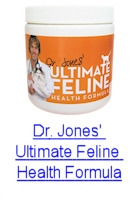 |
You are receiving this e-mail as a part of your subscription to Dr. Jones' newsletter, 'Veterinary Sec.rets'. See subscription information below. |
| |
|

In practice I was seeing some longer lived pets, with 15 being 'the norm'
Consider these super lived pets...
Max, a terrier mix, is 26 years old, according to his owner, Janelle Derouen of New Iberia, La.
A Sphynx cat, Granpa Rexs Allen of Austin, Texas, was 34 years old when he finally died in 1998.
------------------------------
Pet size
------------------------------
The choices we make for our pets can go a long way in affecting their lifespans, so can the pet you pick.
For your dog to live a long time, choose a small or medium-size breed...the smaller the breed the longer the lifespan.
The extra large breeds have the shortest lifespan, such as Great Danes living 7-10 years. Breeds like German shepherds and Golden Retrievers probably live 10 to 13 years while the medium and small breeds 12 to 14 years. In general the Mixed breeds live a bit longer than pure breeds.
------------------------------
Long lived cats
-----------------------------
The longest lived cat breeds include Siamese and Abyssinians, but most well cared for cats can live until their late teens and early 20's.
--------------------
The Genetic Link
--------------------
There is an interesting longevity program going on with Dobermans. The Doberman Pinscher Club has been tracking dogs that reach the age of 10- by breeding the longer lived dogs, they are extending the breeds lifespan.
-------------------------
Avoiding rapid growth
-------------------------
By selecting for slightly slower growing puppies, and by avoiding the TOO high calorie puppy foods, the large breed pups can live longer.
There are studies showing that slightly underweight dogs live an average of two years longer than overweight dogs.
P.S. Is this ALL that affects lifespan?
Nope
And of course we want our pets to have a QUALITY life...not just live longer.
You now can't do much about your pet's genetics, but YOU can control t he other big factor, their diet. he other big factor, their diet.
Avoid the high fat, high carb diets ( especially cat owners)
Minimal vaccines- I encourage the puppy and kitten series, but few vaccines after that.
Feed your pet better- really make an effort to make some of their food, and try some raw if you have yet to do so. I understand how convenient the dry food in the bag is, but as you know, convenience doesn't equate to health or longevity.
If your dog or cat has some type of chronic disease, at least consider some of the alternate options. Most of the holistic remedies have few if any side effects- unlike the conventional drugs.
Lastly I encourage you to have your pets on a complete supplement. I does not need to be my supplement- but it should have: antioxidants, nutraceuticals for joint health, probiotics, and essential fatty acids ( at least).
If you choose to try my supplement- great! It contains all of these ingredients, and more. Plus it comes with nearly 1000 positive testimonials.
You can see it here, and get your 50% off trial:
http://www.thedogsupplement.com
http://www.thecatsupplement.com
Heal Your Pets At Home!
Best Wishes,
Dr Andrew Jones

DISCLAIMER: This information is for educational purposes only and is not intended to replace the advice of your own veterinarian. Dr Andrew Jones resigned from the College of Veterinarians of B.C. effective December 1 2010, meaning he cannot answer specific questions about your pet's medical issues or make specific medical recommendations for your pet.
PRIVACY POLICY: We will never rent, sell, loan, provide, barter, exchange or in any way make available your personal information to others. You can unsubscribe or change your email address at any time using the links at the bottom of this email.
Copyright 2010 Four Paws Online Ltd.
Tel: 1-800-396-1534
Fax: 1-888-398-1378
www.veterinarysecretsrevealed.com
support@veterinarysecretsrevealed.com
|
|
|
|